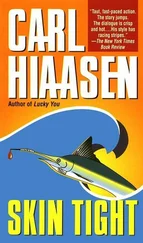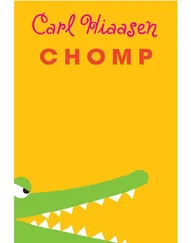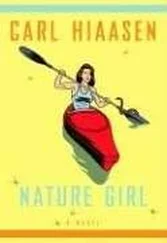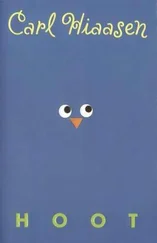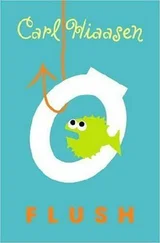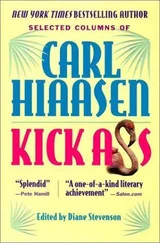Carl Hiaasen - A Death in China
Здесь есть возможность читать онлайн «Carl Hiaasen - A Death in China» весь текст электронной книги совершенно бесплатно (целиком полную версию без сокращений). В некоторых случаях можно слушать аудио, скачать через торрент в формате fb2 и присутствует краткое содержание. Жанр: Детектив, на английском языке. Описание произведения, (предисловие) а так же отзывы посетителей доступны на портале библиотеки ЛибКат.
- Название:A Death in China
- Автор:
- Жанр:
- Год:неизвестен
- ISBN:нет данных
- Рейтинг книги:3 / 5. Голосов: 1
-
Избранное:Добавить в избранное
- Отзывы:
-
Ваша оценка:
- 60
- 1
- 2
- 3
- 4
- 5
A Death in China: краткое содержание, описание и аннотация
Предлагаем к чтению аннотацию, описание, краткое содержание или предисловие (зависит от того, что написал сам автор книги «A Death in China»). Если вы не нашли необходимую информацию о книге — напишите в комментариях, мы постараемся отыскать её.
A Death in China — читать онлайн бесплатно полную книгу (весь текст) целиком
Ниже представлен текст книги, разбитый по страницам. Система сохранения места последней прочитанной страницы, позволяет с удобством читать онлайн бесплатно книгу «A Death in China», без необходимости каждый раз заново искать на чём Вы остановились. Поставьте закладку, и сможете в любой момент перейти на страницу, на которой закончили чтение.
Интервал:
Закладка:
"It is a very sad story, Thom-as," she murmured at last.
"I'm sorry."
"Men should not fight, Thom-as. They should live in peace and build beautiful things. Man is for good, not for killing."
"I wish I could believe that."
"Oh, but it is true. For every evil old man like my father, there are hundreds-many thousand-who are true and loving. Leave your unlocked bicycle at their door and it will be there tomorrow, and the day after. Those are the Chinese people, Thom-as. Not my father, not commissars who play with people's minds."
"Your Uncle David is a good man."
"Yes, I could see that."
"Until today he was the only person who had ever heard my story."
"Thank you."
"I wanted you to know. It was important… "
"I understand. I am not a witch, like one of the old women in Bright Star, but I have seen the sadness inside of you."
"Kangmei, I… "
Stratton let the thought drift away. He watched the swift river, as muddy as his own thoughts. He felt light-headed and empty. And yet purged, as though retelling the horror would at last allow him to file it in some dusty mind bin, where it belonged.
On the far side of the river a young woman led a file of nursery-school children toward an old wooden footbridge. A flock of pigeons alighted in the trees around them. The palm leaves glinted with fleeting gold in the brief tropical dusk.
Soon it would be dark, and a few hours after that he would be gone. Kangmei's family had found a friend of a friend who was a conductor on the overnight train to Canton. Tomorrow the vestige of Captain Black would take over. Canton would be no problem. It was tonight that hurt. Stratton wanted the ghost of Man-ling banished as quickly as the Chinese railroads would allow. He wanted to get to Hong Kong, and from there to save David Wang. But he did not want to leave the strong and idealistic woman at his side.
He was assembling the question when Kangmei spoke. Again, she had anticipated him.
"Have you ever loved, Thom-as?"
"Yes, sure," he said, but he could not separate the images of a cliched decade: blondes and Titians, quiche and Perrier, trim-cut ski jackets, designer sheets.
Carol, who had proved a more devoted doctor than wife, more brittle than beautiful, a better diagnostician than mother.
"No," he said. Not like this.
"I loved once," she said, so far away, so fragile he wanted to gather her into his arms, but dared not molest her privacy.
"A gentle boy, not tall and strong and handsome, but short and plain. One leg was shorter than the other and he limped. His face was so round you thought it was the moon, and he could not see well, so he wore heavy glasses that always slid off his nose and broke. There was no place he could hide: People would point and say, 'Oh, how ugly.' But when they saw what he wrote, no one laughed anymore. His poems were beautiful, like the morning sun creeping along an open field. His poems were as simple as the birds in these trees and as pure as those children across the river.
"He was a happy boy who did not mind being ugly. He laughed at his bad luck and lived for the hours when he could write his poetry. During the days he worked as an electrician in a big factory. At night he would compose in a workers' dormitory. At first he showed his poems only to his friends. That was when he was happiest. He gave poems to his friends as gifts and then showed them to other friends until finally other writers saw them, writers who work without Party control. He gave poems in secret to his friends at the factory and finally the top cadres of the factories saw them, too. The writers went to him and said, 'Write of life. Be freer.' The cadres of his unit went to him and said, 'You have great talent. You must write of the workers' heroic struggle.' "My friend was a happy man who wanted everyone to share his joy. So he wrote for the writers about larks and joy, and he wrote for the cadres about the beauties of blast furnaces and socialist progress. At first both were very pleased.
'More,' they said. 'Write more.' So my friend wrote more, and more, until he could hardly remember whether the next poem was supposed to be about the glorious fulfillment of factory quotas, or every man's right to find his own truth.
"Then one day my friend said, 'No more.' He went to the writers and to the cadres and told them, 'I must write for me, not for you. What I write for you is not me, and it is not good.' They both became very angry, the writers and the cadres. They felt my friend had betrayed them. They yelled and screamed at him.
The factory gave him the most dirty and dangerous jobs. The writers no longer invited him to tea or to walk in the park. My friend became very unhappy. Soon he could not write at all-not even for himself. He would limp around the city looking for inspiration, his great moon face empty, like a man whose father has died. He wrote nothing. All this happened the year that I loved him."
Kangmei smiled through tears. "That is my sad story, Thom-as."
"I'm sorry, Kangmei. Is your friend still in Peking?"
"He is beyond Peking."
"What happened?"
"One day at the factory he picked up two heavy cables in his hands and rubbed them together. They were full of electricity. Perhaps it was an accident… "
"I'm sorry." A temporizing banality.
"I love you, Thom-as."
"I was trying to say the same thing. Come with me, please. We'll find a way to Hong Kong. America is a strange country, I know, but you will like it. If you don't, we can come back to Asia. Anywhere you want… "
"No, Thom-as, no. This is my country. China is where I belong."
"But you will be hunted here. You have sacrificed everything for me. Your school, your family… "
"I have done what is right."
"That will not protect you."
"My relatives here will protect me now. Later, I will find my protection in the millions of young people who believe in China, and who believe as I do. I have talked to you about them and I have seen how you looked at me-like an uncle looks at a young girl who says she can walk to the moon. I am right. You will see."
Damned if she wasn't mad, twin points of color blazing from her cheeks.
Stratton tried not to sound patronizing.
"Kangmei, let's not argue. I believe in your vision, but I want to be with you.
If a man and a woman can find love-isn't that enough?"
"I, too, have thought about that. I am… confused. A part of me wants to go with you, but another part insists that I stay. So I will stay and I will think. I-"
"Look!" Stratton was on his feet, pointing. On the far side of the river, bellowing in fear, blind with pain, ran a pig. In the failing light, Stratton could see the stream of blood that marked the pig's passage and, in distant pursuit, a peasant with a knife. Running pig of Chinese commune-ism. A weak joke.
There was nothing funny about the running pig.
It veered onto the narrow dirt promenade that paralleled the one Stratton and Kangmei had walked on their side of the river. Striking from behind, the dying pig tore through the line of schoolchildren like a berserk bowling ball. The youngsters flew to the left and right. Most were simply shuffled. Stratton saw one trampled. A peasant woman in black dumped a load of laundry from her head and kicked viciously at the pig. It staggered off the path. The young teacher who had been leading the children screamed. Around her frightened, crying children needed immediate attention and reassurance. But that was not the worst of it. Two of the children-they could not have been more than three years old-tumbled down the steep bank and into the river. First the boy, then the girl. They made twin ripples.
"Aiyee!" Kangmei screamed.
Across the river, Stratton could see men running. Behind him, too, there came the sound of feet. They were all too far away. And in minutes, the rescuers would need flashlights if they were to be of any use at all.
Читать дальшеИнтервал:
Закладка:
Похожие книги на «A Death in China»
Представляем Вашему вниманию похожие книги на «A Death in China» списком для выбора. Мы отобрали схожую по названию и смыслу литературу в надежде предоставить читателям больше вариантов отыскать новые, интересные, ещё непрочитанные произведения.
Обсуждение, отзывы о книге «A Death in China» и просто собственные мнения читателей. Оставьте ваши комментарии, напишите, что Вы думаете о произведении, его смысле или главных героях. Укажите что конкретно понравилось, а что нет, и почему Вы так считаете.

